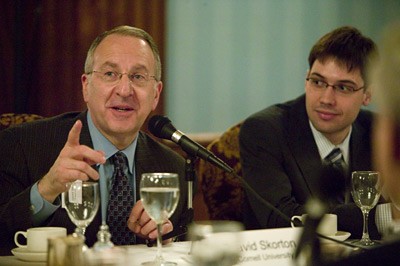Higher education should not be seen as interest group, but as problem solver, Skorton tells national media
By Kanika Arora
If Cornell President David Skorton had one recommendation to give the next U.S. president about science research and science education, it would be to boost funding for non-defense research, he said at a roundtable discussion of 10 university presidents and chancellors and more than a dozen national reporters, March 19, at the Penn Club in New York City.
"We are currently reaping the benefits of basic applied research done in the '60s and '70s," said Skorton, addressing reporters from such media outlets as Nature magazine, The New York Times, National Public Radio, Inside Higher Education and NBC. "This experience should encourage us to appropriate more resources in such research."
But such research needs strong science education backing it up, said Skorton. Regardless of "which candidate or party wins the next election, science education is hardly visible as a priority on the national agenda," Skorton said. "For it to be given its due importance, higher education, especially in science and math, must be looked at as a problem solver and not as a separate interest group."
While science and technology may not be highly visible items on the national agenda, added William Powers, president of the University of Texas at Austin, economic competitiveness and health care are. "Global sustainability, alternative fuels, biomedical and other scientific research that provide answers to economic and other problems must be seen as an important link in the equation," he said.
Agreeing with Skorton and Powers, Rebecca Chopp, president of Colgate University, said, "The role of university presidents is to present scientific research in an interpretative framework to higher authorities. The problem also needs to be dealt with at the local level – where K-12 teachers are not paid competitive salaries, and parents themselves resist more rigorous math and science curriculums."
Robert Bazell, chief science and health correspondent for NBC, questioned whether complaints about government funding were legitimate, since there have been considerable increases in science-based funding to higher education over the years, and he repeated Sen. Chuck Grassley's criticism that universities should be spending more of their endowments.
Skorton was quick to respond, "Looking at the dollar-amount increase over the years is the wrong metric to use. We must keep in mind that the population and culture is much more science-based now than it was before. The right metric would be to look at funding as a percentage of GDP or the size of the economy. Also, Sen. Grassley's comments related solely to implementation of spending. That does not change the argument that science education is underfunded in present times."
When asked about the potential impact of a possible economic recession on higher education, Lois DeFleur, president of New York state's Binghamton University, said, "Certainly there will be access issues to deal with as tuition may increase dramatically. This will affect student volume, especially potential entrants from the lower socioeconomic strata. It might also lead to more professors and faculty in public schools seeking out employment in private universities."
Skorton added, "Since Cornell receives funding from government and private sources, it will also have to face some of these issues, in addition to apprehension from alumni and private donors. We will have to adjust the cost side of the equation, as well, to deal with the revenue picture."
Kanika Arora, MPA '07, is a Cornell Chronicle writer in New York City.
Media Contact
Get Cornell news delivered right to your inbox.
Subscribe